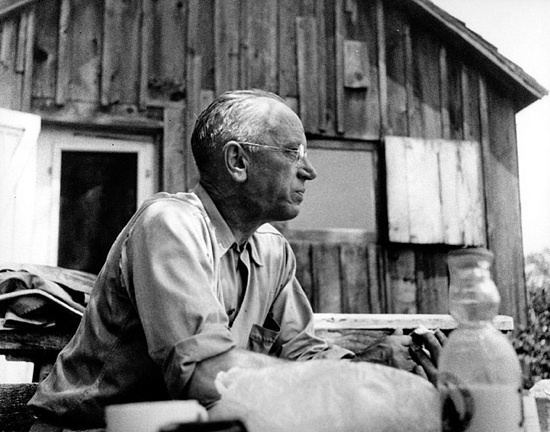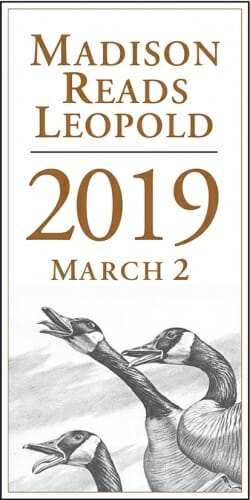Madison Reads Leopold returns to UW Arboretum March 1–3

Aldo Leopold, a 20th-century conservationist and former UW–Madison faculty member, is shown at his Sauk County shack in about 1940. UW-Madison archives
The University of Wisconsin–Madison Arboretum will host the 14th annual public reading of “A Sand County Almanac” and other Aldo Leopold writings on Saturday, March 2, as part of its Madison Reads Leopold community event.
The event is free and open to the public and will take place at the Arboretum Visitor Center, 1207 Seminole Highway, from 9:30 a.m. to 3:45 p.m. The readings are part of Aldo Leopold Weekend, which since 2006 has celebrated the life of the noted conservationist during the first weekend in March.
 Starting at 9:30 a.m., former Madison Mayor Dave Cieslewicz will kick off the event with a reading of “January Thaw,” the first essay in Leopold’s book. Throughout the day, a mix of public figures and community readers will give voice to Leopold’s keen observations and eloquent conservation philosophy. The readings will include the well-known January–December calendar essays, as well as other pieces chosen for their relevance to the Arboretum, UW–Madison and the state. Listeners are welcome to drop in for their favorite essays or stay all day.
Starting at 9:30 a.m., former Madison Mayor Dave Cieslewicz will kick off the event with a reading of “January Thaw,” the first essay in Leopold’s book. Throughout the day, a mix of public figures and community readers will give voice to Leopold’s keen observations and eloquent conservation philosophy. The readings will include the well-known January–December calendar essays, as well as other pieces chosen for their relevance to the Arboretum, UW–Madison and the state. Listeners are welcome to drop in for their favorite essays or stay all day.
Readers include Madison Poet Laureate Oscar Mireles; radio personalities Jim Fleming and Chuck Quirmbach; Madelyn Leopold, daughter of Luna Leopold and granddaughter of Aldo; Mark Miller, Wisconsin state senator; and Mark Miller, Wisconsin state senator. Also reading will be a 5th grader from Randall School; a staff member from the USDA Forest Products Laboratory, where Leopold worked when the family first moved to Madison in 1924; plus students, educators, naturalists, writers, representatives of community organizations and others.
Arboretum director Karen Oberhauser will lead off the afternoon readings with excerpts from the speech Aldo Leopold gave at the Arboretum’s dedication ceremony on June 17, 1934. Leopold was the Arboretum’s first research director and was closely involved in its design.
At approximately 2 p.m., arts and education consultant Jon Becker will narrate Leopold-related selections from “Earth Day Portrait.” Created by jazz pianist and composer John Harmon, “Earth Day Portrait” is a symphonic setting for texts by Leopold and fellow environmentalists John Muir and Gaylord Nelson.
First published in 1949, “A Sand County Almanac” has prompted generations of people to take better notice — and care — of the natural environment. This year marks the 70th anniversary of the publication of the environmental classic.
First published in 1949, “A Sand County Almanac” has prompted generations of people to take better notice — and care — of the natural environment.
Light refreshments will be available in the visitor center lobby. Outside food is permitted but must remain in the Visitor Center. Leopold archival materials and artifacts from UW–Madison’s extensive collection will be on display.
A full schedule of readers and essays is available on the Arboretum website. Reading times are approximate; listeners wishing to hear a particular reader should arrive at least 10 minutes before the scheduled time.
Also at the Arboretum during Leopold Weekend:
- Friday, March 1, 11 a.m.–2 p.m.: “Green Fire” Brown Bag. Watch and discuss the Aldo Leopold documentary film over lunch. Bring your own food and beverage. Free, no registration required.
- Sunday, March 3, 1–2:30 p.m.: In Leopold’s Footsteps. Learn about Leopold’s phenological work and role at the Arboretum. Free naturalist-led walk.
- Sunday, March 3, 1:30–3:30 p.m.: Celebrating Aldo Leopold. As a boy, Leopold read, explored the land, kept notes and drew sketches. During this family nature program, investigate the Arboretum and create journals for observations and drawings. Designed for families with children ages 3–11.
Leopold Weekend in Wisconsin began in Lodi in 2000, and six years later it became a designated state observance. The first weekend in March was chosen because Leopold appended the date “4th March, 1948” to his “Almanac” foreword. It would be his last writing for the work, since he died unexpectedly six weeks later.
